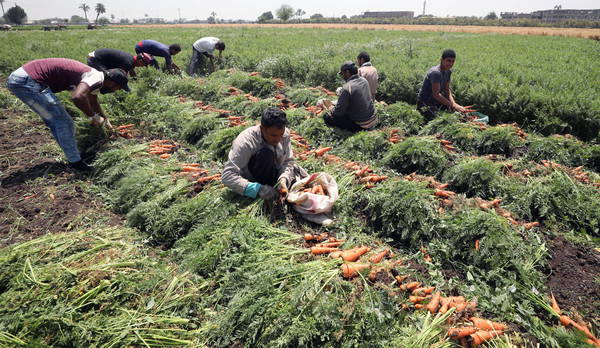Rural development and food security have always been priority sectors of the Italian cooperation in the country, and over the years the Agency has relied on fruitful collaborations with local and international actors and institutions, including the Ministry of Agriculture and Reclamation, the Desert Research Center the Agricultural Research Center, the General Authority for Fish Resources Development (of the Egyptian Ministry itself), the Ministry of Trade and Industry, the Mediterranean Agronomic Institute (IAM) in Bari, various Italian and Egyptian NGOs, and United Nations agencies such as FAO, UNIDO and WFP.
Since 2014, the Italian Cooperation has taken on the role of coordinator, together with FAO, of the related thematic platform for the agriculture and rural development sectors, which brings together donors in Egypt (Development Partners Group – DPG). With the United Nations Industrial Development Organization (UNIDO), the Egyptian Cotton Supply Chain Development project plays a considerable role in promoting sustainability and inclusiveness along the cotton value chain, while strengthening the valuable quality of Egyptian cotton and fostering new market opportunities. The tomato supply chain support program, also with UNIDO, on the other hand, aims to support the value of production for processing by improving the technical skills of young people, and thus their employment opportunities.
Moreover, jointly with the Ministry of Agriculture and Reclamation the “SAMSIMIFA” project enables, through the technical assistance of IAM Bari, the improvement of agricultural mechanization systems in the governorates of Minya and Fayoum.
In this sector also the delegated cooperation program “EU-ZIRA3A -Integrated Rural Development Program for Egypt” is being implemented. The program aims to strengthen smallholder farmers but also local counterparts to provide quality services to support food security, irrigation and the dairy sector.
The EU-KAFI project “Supporting Grain Production in Egypt” is another delegated cooperation program that aims to support the grain production system, and grain storage in Egypt, which is facing a serious shortage and difficulties in meeting the needs for this grain. The project is based on three main axes that cover the entire grain production and storage chain: the first axis is based on the production of high-quality, highly productive varieties that are resistant to diseases and climatic and environmental conditions. The second axis is based on supporting the fleet of agricultural equipment used to grow and harvest grain in five of the largest governorates that produce these crops. The third axis aims to establish five field silos to store the grain produced by farmers in a safe and healthy manner, and to prevent the losses now occurring, as a result of storage on open land. The program also supports an existing system for monitoring the flow of grain between production, import and storage areas.
With funding from the Italian-Egyptian Debt Swap Program, three projects are being implemented: the first aims to improve food security and the value of local grain production by increasing storage efficiency and reducing the government’s physical and economic losses through the introduction of modern technologies; the second aims to develop and consolidate the aquaculture sector in Egypt’s north coast by providing technical support to the public and private sectors to establish a state-of-theart aquaculture district, and improve the technical and economic capacities of farmers as well as the performance of the General Authority for Fisheries Resource Development (GAFRD, in its English acronym) to provide up-to-date technical service. The third is a project that aims to support an existing Egyptian national project to produce hybrid vegetable seeds with high productivity and quality characteristics. It aims to produce vegetable seeds for 8 crops and to support the technicians involved in this work with intensive training programs, as well as to support and strengthen the infrastructure needed for the production, monitoring, and registration of productive vegetable seeds.
Finally, a project is being implemented to strengthen the Siwa date production chain through the use of sustainable agricultural practices and the creation of a geographical indication, while also supporting marketing strategies for the product. The project is funded by the Italian counterpart funds generated by the food aid program for Egypt.
